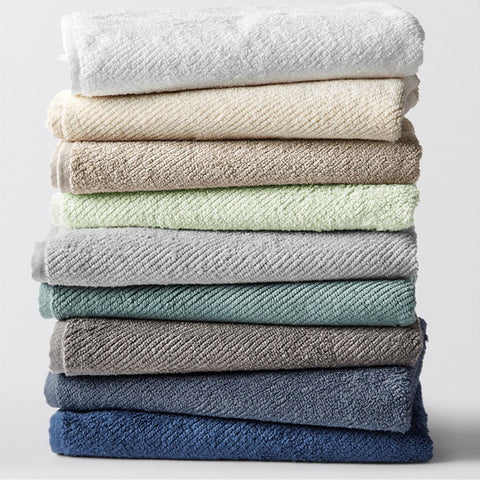5 Tips for Buying Organic Bath Towels

There are many different types of natural bath towels to choose from: cotton, bamboo, linen, hemp and even wood fiber. Each one has its own unique look, feel and absorbency rate. Some are certified organic; others are produced via sustainable methods. How do you decide which one to buy? Here are five tips to help you choose the best for you:
1. Look for 100% natural fiber towels without synthetic additives or chemical-finishes
For the purest, most natural towels make sure they are certified organic or produced via sustainable methods. Avoid a natural and synthetic fiber blend. Synthetic fiber, such as polyester, gives towels temporary softness, sheen and plushness through extensive chemical processing. It can also reduce the towel’s absorbency and attract odor build up over time, even after repeated washings.
2. Choose natural bath towels that feel good and are highly absorbent
The type of natural fiber used in a bath towel contributes greatly to how it feels against your skin. It also determines how well the towel absorbs water and how quickly it dries after use. Here’s an overview of what you can expect:
- Certified Organic Cotton: the feel varies from soft to coarse depending on the brand. Cotton towels take a little longer to dry than other natural fibers, especially the extra plush, heavy weight styles.
- Bamboo Viscose: the feel is silky-soft, some people describe the feel as slick. A towel made with 100% bamboo viscose or blended with a small percentage of organic cotton generally dries faster than cotton.
- Organic Linen or Hemp: the feel is not as soft as organic cotton or bamboo towels but these fibers are very absorbent and dry quickly. Linen and hemp towels, whether they're a plush-terry style or a flat weave, have a lot of body and substance with a slightly coarse texture that gets softer with every wash.
3. Consider the towel’s weight to determine thickness
The weight of a towel refers to the fabric density and is measured in GSM (grams per square meter). Towels with a high GSM, such as 550 or 700, are considered medium to heavy weight. They feel thick and plush, making them a favorite for the bathroom. A lighter, thinner towel will have a lower GSM, which is a good choice if you like a flatter, less plush feel.
4. Fabric: Look for textures and colors that suite your bathroom decor
Most bath towels are made from terry cloth, a looped pile fabric. You’ll find terry cloth comes in a variety of textures ranging from plain to classic twill to fancy jacquard geometrics and florals.
If terry cloth isn’t your style, look for natural bath towels made from alternative fabrics such as a non-pile flat weave commonly used in linen bath towels or a cotton waffle weave known as a “spa” towel.
5. Quality-Make:
Look for tightly woven side edges and hems along both ends of the towel. Stitching on bound or hemmed edges should be secure so it won’t unravel in the wash.
